
- Subject:
- Arts and Humanities
- Material Type:
- Full Course
- Provider:
- Rice University
- Provider Set:
- OpenStax College
- Date Added:
- 01/06/2016


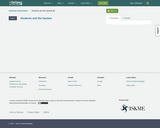
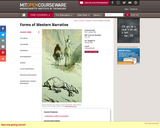
Major narrative texts from diverse Western cultures, beginning with Homer and concluding with at least one film. Emphasis on literary and cultural issues: on the artistic significance of the chosen texts and on their identity as anthropological artifacts whose conventions and assumptions are rooted in particular times, places, and technologies. Syllabus varies, but always includes a sampling of popular culture (folk tales, ballads) as well as some landmark narratives such as the Iliad or the Odyssey, Don Quixote, Anna Karenina, Ulysses, and a classic film. This class will investigate the ways in which the formal aspects of Western storytelling in various media have shaped both fantasies and perceptions, making certain understandings of experience possible through the selection, arrangement, and processing of narrative material. Surveying the field chronologically across the major narrative genres and sub-genres from Homeric epic through the novel and across media to include live performance, film, and video games, we will be examining the ways in which new ideologies and psychological insights become available through the development of various narrative techniques and new technologies. Emphasis will be placed on the generic conventions of story-telling as well as on literary and cultural issues, the role of media and modes of transmission, the artistic significance of the chosen texts and their identity as anthropological artifacts whose conventions and assumptions are rooted in particular times, places, and technologies. Authors will include: Homer, Sophocles, Herodotus, Christian evangelists, Marie de France, Cervantes, La Clos, Poe, Lang, Cocteau, Disney-Pixar, and Maxis-Electronic Arts, with theoretical readings in Propp, Bakhtin, Girard, Freud, and Marx.
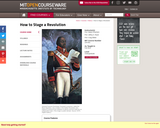
This course explores fundamental questions about the causes and nature of revolutions. How do people overthrow their rulers? How do they establish new governments? Do radical upheavals require bloodshed, violence, or even terror? How have revolutionaries attempted to establish their ideals and realize their goals? We will look at a set of major political transformations throughout the world and across centuries to understand the meaning of revolution and evaluate its impact. By the end of the course, students will be able to offer reasons why some revolutions succeed and others fail. Materials for the course include the writings of revolutionaries, declarations and constitutions, music, films, art, memoirs, and newspapers.
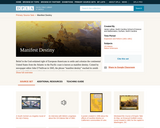
This collection uses primary sources to explore the idea of Manifest Destiny and its influence. Digital Public Library of America Primary Source Sets are designed to help students develop their critical thinking skills and draw diverse material from libraries, archives, and museums across the United States. Each set includes an overview, ten to fifteen primary sources, links to related resources, and a teaching guide. These sets were created and reviewed by the teachers on the DPLA's Education Advisory Committee.
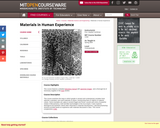
Examines the ways in which people in ancient and contemporary societies have selected, evaluated, and used materials of nature, transforming them to objects of material culture. Some examples: glass in ancient Egypt and Rome; powerful metals in the Inka empire; rubber processing in ancient Mexico. Explores ideological and aesthetic criteria often influential in materials development. Laboratory/workshop sessions provide hands-on experience with materials discussed in class. Subject complements 3.091. Enrollment may be limited.
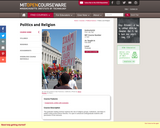
This graduate reading seminar explores the role of religious groups, institutions, and ideas in politics using social science theories. It is open to advanced undergraduate students with permission of the instructor.
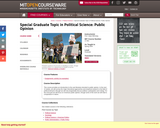
This course provides an introduction to the vast literature devoted to public opinion. In the next 12 weeks, we will survey the major theoretical approaches and empirical research in the field of political behavior (though we will only tangentially discuss political participation and voting). For the most part we will focus on American public opinion, though some of the work we will read is comparative in nature.